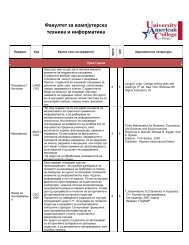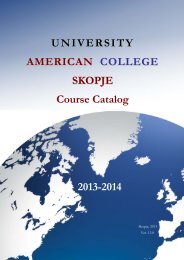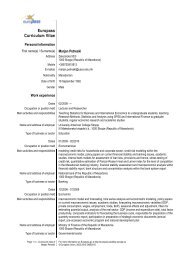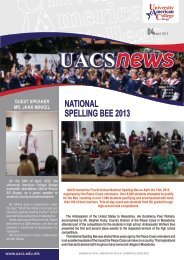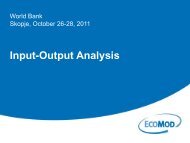BOOK OF ABSTRACTS - University American College Skopje
BOOK OF ABSTRACTS - University American College Skopje
BOOK OF ABSTRACTS - University American College Skopje
You also want an ePaper? Increase the reach of your titles
YUMPU automatically turns print PDFs into web optimized ePapers that Google loves.
OUT <strong>OF</strong> THE CRISIS: EU ECONOMIC AND SOCIAL POLICIES RECONSIDERED8 th Annual international conference on European integrationWelcome to the 8th annual international academic conference on European integrationOUT <strong>OF</strong> THE CRISIS: EU ECONOMIC AND SOCIAL POLICIES RECONSIDEREDThursday 16 May 2013The European Union is slowly emerging from the deepest economic recession in its history.Long-standing challenges like insufficient growth and population ageing have been coupled withfiscal instability and deep fissures within the euro-zone. Competitiveness and unemploymentindicators place the EU behind its main global rivals. Moreover, the crisis has put in doubt the overallpolitical architecture and economic governance of the Union. With millions of citizens unemployed,to amend inequalities and sustain a democratic and social Europe have become issues of legitimacyfor the European political elite and for the whole project of united Europe. While member statestend to keep the main focus on national interests and well-being of their citizens, EU’s politicoeconomicmodel as a pole of attraction for the aspirant countries is clearly in decline.This inter- and multi-disciplinary conference seeks to reconsider the current EU complexitiesacross diverse policy areas and suggest perspectives on growth and ways leading out of the crisis.Major issues to be addressed include, but are not limited to:Austerity or Growth Union?How to amend state structures to sustain economic growth in Europe?Scientific and technological achievements, renewable energy sources and sustainablegrowthHow to save the euro, or the EU without the euro?Synergy of competitive capitalism and the welfare state: setting an integrated socioeconomicagendaEU funds: assessing their scope and effectivenessEconomic rationale behind investments in education and human capital in generalEU Cohesion Policy reconsidered: perspectives on regional and urban developmentHow to overcome the democratic deficit in the EUEU integration and enlargement: opportunities for success vs. likely alternatives to theprojectThe times of crisis have always presented a chance for the academic world to offerconstructive response so as to catalyze positive change. We are looking forward to your participationin the one-day program of the conference in <strong>Skopje</strong> on 16 May 2013.Sincerely Yours,Prof. Marjan Bojadziev, PhDUACS Rector
OUT <strong>OF</strong> THE CRISIS: EU ECONOMIC AND SOCIAL POLICIES RECONSIDERED8 th Annual international conference on European integrationCONFERENCE PROGRAM8:45 - 9:15 Registration9:15 - 10:45 Opening ceremonyOpening addresses:Dr. Fatmir Besimi, Deputy Prime Minister for European Affairs in the Government of the Republic ofMacedoniaMrs. Gudrun Elisabeth Steinacker, Ambassador of the Federal Republic of Germany to MacedoniaDr. Heinz Bongartz, Resident representative of Friedrich-Ebert-Stiftung, office MacedoniaDr. Ivan Dodovski, UACS Assistant Professor and Chairperson of the Conference OrganizingCommitteeOfficial key speakers:Ms. Anita Angelovska-Bezoska, Vice Governor of the National Bank of the Republic of Macedonia:The Euro Zone Crisis through Economic Glasses: Origins, Responses and Challenges AheadDr. Dimitris Akrivoulis, Assistant Professor of International Relations at <strong>University</strong> of WesternMacedonia, and Adjunct Professor of Politics and International Relations at New York <strong>College</strong>,Thessaloniki, Greece: "We All Knew This": Digging Ourselves Out of the HoleMaster of Ceremony:Dr. Stevo Pendarovski, UACS Associate Professor in International Security and Foreign AffairsNote: Working language of the conference is English.10:45-11:15 Coffee break11:15-13:00 Working session – parallel academic tracks 1 & 213:00-13:45 Lunch13:45-15:15 Working session - parallel academic tracks 1 & 215:15-15:45 Coffee break15.45-16:30 Closing plenary session
OUT <strong>OF</strong> THE CRISIS: EU ECONOMIC AND SOCIAL POLICIES RECONSIDERED8 th Annual international conference on European integrationBiographyAnita Angelovska-Bežoska has 16 years of experience, mostly in the areas of monetary policy,macroeconomic policies in general, fiscal policy and public finance management. Currently, sheholds a position of a vice-governor of the National Bank of the Republic of Macedonia (NBRM).Previously, she held a position of Chief Economist of the NBRM, involved in the area of design andimplementation of the monetary policy, macroeconomic forecasting, analysis and research. Sheworked for the International Monetary Fund in Washington as an economist in the EuropeanDepartment and Fiscal Affairs Department for two years. As a leader of the task force forestablishment of the treasury system in Macedonia, and later on as a head of the Treasury at theMinistry of Finance, she participated in the process of reforming the public finance managementsystem in the Republic of Macedonia. She also held a position of State Secretary in the Ministry ofFinance, and was a member of the Management Board of the Health Insurance Fund and theDeposit Insurance Fund of the Republic of Macedonia. She holds an MBA degree from the Faculty ofEconomics in <strong>Skopje</strong>, and since 2009 she has been working on her doctoral thesis at the Faculty ofEconomics in Ljubljana, Slovenia.Dimitrios E. Akrivoulis is an Assistant Professor of IR in the Balkans at the Dept of Balkan Studies(UOWM) and a Visiting Professor at UACS. He has also taught at the <strong>University</strong> of Kent, UK, and NYCThessaloniki. He holds an LLB and an LLM from the Aristotle <strong>University</strong> in Thessaloniki, and a PhD inIR from the <strong>University</strong> of Kent. He is an active member of PSA, BISA, ECPR, and HESILIR. His interestsinclude International Political Theory and Continental Political Thought. His work has been publishedby international publishing houses, such as Macmillan, Palgrave, Routledge, and Peter Lang.
OUT <strong>OF</strong> THE CRISIS: EU ECONOMIC AND SOCIAL POLICIES RECONSIDERED8 th Annual international conference on European integrationAcademic Track I: EU Politics and EU Social PoliciesModerator: Ivan Dodovski, UACS Assistant ProfessorOpening remarks: Robert Hudson, Full-time Professor at <strong>University</strong> of Derby, UKRapporteur: Ana Tomovska-Misoska, UACS Assistant ProfessorGaspar Biro: We, the States of the Union…Biljana Sekulovska Gaber, Marijana Sekulovska: Territorial Cohesion: A Bridging ConceptZlat R. Milovanovic: Migrations In the European Union: Looking Ahead to 2050Stevo Pendarovski, Zoran Sapurik: EU Crisis and the Western Balkans: Enlargement UnaffectedKatharina Crepaz: The Impact of Internationalization and Norm Transfer on Minority ProtectionPoliciesNatasha Gaber-Damjanovska: The Constitutional Principle of the Equality of Vote Viewed Through theEU Standards – the Case of Ex-Patriot VoteGanka Cvetanova, Veno Pachovski: E-democracy Strategy in the Republic of Macedonia in theContext of E-democracy Strategies in EU Member StatesKimo Cavdar: Implementation of EU Directives on Consumer Protection in the Countries of the FormerYugoslavia: Focus on National Laws on ObligationsKrum Efremov: Economic Diplomacy as a Strategy for Sustainable Economic GrowthAna Stojilovska: Green, Greener, the Greenest: Western Balkan Countries on Test – Lessons forMacedoniaEmilija Tudzarovska-Gjorgjievska: Economic Rationale behind Investments in Education and HumanCapital in GeneralMarija Andonova, Nikica Mojsoska-Blazevski: Factors Influencing the Wage Expectations AmongMacedonian Students: A Comparative Perspective with the EU Students15.45-16:30 Closing plenary session
OUT <strong>OF</strong> THE CRISIS: EU ECONOMIC AND SOCIAL POLICIES RECONSIDERED8 th Annual international conference on European integrationMMag. Phil. Katharina Crepaz<strong>University</strong> of Innsbruck, Austriakatharina.crepaz@student.uibk.ac.atThe Impact of Internationalization and Norm Transfer on Minority Protection PoliciesIn the recent years of financial crisis, the EU has mainly been scrutinized from an economicperspective, and been evaluated on the basis of its performance on this sector. However, the Unionhas not only brought the continent closer together by creating a common economic area, but it hasalso repeatedly proclaimed itself to be a community based on international standards of humanrights and minority protection. By doing so, an international arena for these issues was created,providing a forum to mobilize and exert pressure on often reluctant nation states; a very importantissue, as in the face of economic crisis, minorities are often among the first groups to lose financialor other specific group rights. This paper argues that the internationalization of minority issues, asprovided by the EU or through other means and organizations, is an important factor in making stepstowards empowerment. If a nation state is reluctant to adhere to protection norms, theinternationalization of the problem can lead to wider recognition, which could then generate morepressure on domestic actors. Internationalization can also lead to shaming processes, if the state ismade aware of its deviant behavior from the norm entrepreneur group it aims to belong to.By looking at other variables that have an impact on minority protection being implemented (such asthe presence of conditionality, the degree of conflict of international norms with state preferences,the presence of a kin-state in the EU and the strength of civil society), I will try to show thatinternationalization can be a crucial factor in norm adoption. Four countries will serve as casestudies and examples for different outcomes and modes of norm transfer: Italy, France, Croatia, andPoland.Keywords: minority protection policies, international norms, EU promotion of human rightsBiographyBorn in Sterzing/Vipiteno, Italy, in 1986. Mag. Phil. (M.A.) degrees in Political Science and English and<strong>American</strong> Studies. Currently PhD-Candidate in Political Science at the <strong>University</strong> of Innsbruck,Austria. Main research interests include the EU's role regarding minority protection policies andhuman rights, as well as the relation between international norms and actual policy change.
OUT <strong>OF</strong> THE CRISIS: EU ECONOMIC AND SOCIAL POLICIES RECONSIDERED8 th Annual international conference on European integrationProf. Natasha Gaber-Damjanovska, PhDJudge of the Constitutional Court of the Republic of Macedoniangaberdamjanovska@gmail.comThe Constitutional Principle of the Equality of Vote Viewed Through the EU Standards – the Case ofEx-Patriot VoteElection systems in modern democracies are continuously remodeled and adjusted to meet theneeds of societal changes. One of the recent issues regarding elections that attract the attention ofcomparative politics are the mechanisms countries adopt in order to allow the countries’ nationalswho have permanently moved out of the country to be able to vote. This topic raises various, oftenopposed opinions on the manner in which this right ought to be realized, the type of vote accordingto which the ex-patriots would be able to vote (national elections, presidential elections or/andreferendums), the number of seats reserved for the ex-patriots representation compared to thenational seats, the election model selection and adjustments, etc. According to internationaldocuments and conventions, expert recommendations (OSCE/ODIHR and others), and theMacedonian Constitution as well, one of the election principles that by all means ought to berespected while creating the election model of the country is to consider the equality of voteprinciple. This indispensable rule, that is essential for democracy built on equality of citizens oughtto be respected for all types of elected political representation, including the seats dedicated to theex-patriot votes. This paper intends to analyze whether in legal and practical terms the equality ofvote is respected in the case of domestically elected member of Parliament compared to the electedex-patriot MPs, including experience and comparison with other countries. Included are theOSCE/ODIHR recommendations on the Macedonian Electoral Codex, the Venice Commissionrecommendations, as well as studies and comparative papers from IDEA, IFES and otherorganizations and authors.Keywords: elections, equality of vote, political representation, ex-patriot vote, out-of-the-countryvoteBiographyDr. Gaber-Damjanovska holds a Master’s degree in Legal and Political Science and a Ph.D. in PoliticalScience from the <strong>University</strong> St. Cyril and Methodius in <strong>Skopje</strong>. She also serves as the President of theBoard of Macedonian Center for International Cooperation (NGO) and has taught several courses onelection systems, civil society legal framework, women in politics, and globalization and worldpolitics. She has participated in many domestic seminars and workshops, commenting on andemphasizing the cooperation between the civic sector and businesses, and raising corporateresponsibility awareness especially from the business side. She also serves as a visiting professor atthe Faculty of Law, tackling the domestic legal environment regarding the civic sector and itsrepercussions on the economy, and looking at the possibility of introducing legal change for tax andother benefits for the civic organizations.
OUT <strong>OF</strong> THE CRISIS: EU ECONOMIC AND SOCIAL POLICIES RECONSIDERED8 th Annual international conference on European integrationAssoc. Prof. Ganka Cvetanova, PhD, Assoc. Prof. Veno Pachovski, PhD<strong>University</strong> Ss. Cyril and Methodius<strong>University</strong> <strong>American</strong> <strong>College</strong> <strong>Skopje</strong>, Macedoniaganka968@yahoo.com; pachovski@uacs.edu.mkE-democracy Strategy in the Republic of Macedonia in the Context of E-democracy Strategies in EUMember StatesAccording to Webster’s definition “democracy is a government in which the supreme power is vestedin the people and exercised by them directly or indirectly through a system of representation”. An “e”in front of democracy refers to using the new Information and Communication Technologies (ICT) inorder to increase and enhance citizens’ engagement in democratic processes. E-democracy concernsall sectors of democracy, all democratic institutions and all levels of government, thus striving topromote, ensure and enhance the basic pillars of democracy such as transparency, accountability,responsiveness, engagement, deliberation, inclusiveness, accessibility, participation, subsidiarity andsocial cohesion. E-democracy is an integral part of the information society, which has ushered in arange of traditional and innovative tools that can usefully be applied in democratic processes andinstitutions. The paper analyzes the e-democracy strategy and levels of citizen involvement in theRepublic of Macedonia while attempting to compare with the e-democracy strategies and citizensinvolvement in the EU Member States, presented in the Handbook on E-democracy, drafted, writtenand published as a part of the EPACE project (Exchanging good practices for the promotion of anactive citizenship in the EU), produced with the financial support of the Fundamental Rights andCitizenship programme of the European Commission. Comparing the existing documents and thelevels of citizen involvement, we tried to define the position of the Republic of Macedonian in thecontext of e-democracy strategies in EU Member States and to determine the levels of involvement.Keywords: e-democracy, e-tools, e-democracy strategy, levels of involvement, Republic ofMacedonia, EU Member States.BiographyGanka Cvetanova was born in <strong>Skopje</strong>, Macedonia in 1968. She graduated from the Faculty of MusicArt 1989, and completed her MA at the same institution in 1994. She got her PhD in Sociology at theInstitute for Sociological, Political and Juridical Research (ISPPI) at the <strong>University</strong> Sts. Cyril andMethodius in <strong>Skopje</strong> in 2006. In the period from 2008 until 2010 she was engaged as a visitingprofessor at the <strong>University</strong> <strong>American</strong> <strong>College</strong> – <strong>Skopje</strong> in the field of ethnic conflicts and conflictmanagement. In 2010 she was elected as Associate Professor at the ISPPI. Currently, she is the headof postgraduate cultural studies at ISPPI. She lectures the following courses: Culture and Identity;Ethnic Identity; Cultural Politics and Cultural Institutions; Digital Culture; New Media and Democracy.Veno Pachovski was born in <strong>Skopje</strong>, R. Macedonia in 1965. He graduated from Faculty of NaturalSciences and Mathematics, State <strong>University</strong> Sts. Ciril and Methodius, <strong>Skopje</strong>, Macedonia 1989, andcompleted MSc in the same institution in 2000. He got his PhD in Information retrieval at the<strong>University</strong> Sts. Cyril and Methodius in <strong>Skopje</strong> in 2007. Since 2009, he teaches a variety of courses atthe <strong>University</strong> <strong>American</strong> <strong>College</strong> – <strong>Skopje</strong>, mainly within the School of Computer Sciences andInformation technology (SCSIT). In 2012 he was elected as Associate professor at the UACS.Currently, he holds a Vice-dean position within SCSIT in charge of the part-time students, as well asheads the Linguistic modelling laboratory. His fields of expertise include Databases, Informationsystems and Natural language processing.
OUT <strong>OF</strong> THE CRISIS: EU ECONOMIC AND SOCIAL POLICIES RECONSIDERED8 th Annual international conference on European integrationMarija Andonova, Assoc. Prof. Nikica Mojsoska-Blazevski, PhD<strong>University</strong> <strong>American</strong> <strong>College</strong> <strong>Skopje</strong>, Macedonianacova@uacs.edu.mk; nikica@uacs.edu.mkFactors Influencing the Wage Expectations among Macedonian Students: A ComparativePerspective with the EU StudentsThe aim of this paper is to assess the wage expectations of Macedonian students, and main factorsthat shape their expectations. Previous research elsewhere has shown that wage expectation is amajor determinant that influences’ schooling decision (Wolter and Zbinden, 2001, Williams andGordon, 1981, Betts, 1996). Given that the main pathway to developing human capital of anindividual is schooling, learning about the factors that affect individual’s decision whether to acquiremore education can contribute towards better educational policy in the country. We employ similarempirical approach as the one used by Brunello et al (2001, 2004). We use available information toregress: i) students’ beliefs about expectations for future salary with high school diploma; ii) futureearnings with college degree; and iii) college wage gain, on a set of variables which includes:university dummies, characteristics of the individual, socio-economic background, field of study, yearof enrolment, academic performance, sources of information for future earnings and reasons foruniversity choice. Data would be collected through a questionnaire distributed to Macedonianstudents from different universities, in their first and last year of study. We expect that results fromthis study will be in line with the results disclosed by other researchers, where wage expectationsare determined by a complexity of variables including: (a) socio-economic background of a student,(b) gender, (c) degree type, (d) academic performance, etc.Keywords: demand of schooling, wage expectations, higher educationBiographyMarija Andonova, BSc, is a teaching assistant in Business Mathematics and Statistics at the <strong>University</strong><strong>American</strong> <strong>College</strong>-<strong>Skopje</strong> (UACS). She graduated from <strong>University</strong> St Cyril and Methodius-<strong>Skopje</strong>,Faculty of Natural Sciences and Mathematics-Department of Mathematics. She continued hereducation by enrolling MBA studies at the UACS and is currently working on her Master thesis.Previously, she worked as a teacher in middle and secondary school. She attended several educationworkshops and seminars.Dr. Mojsoska Blazevski is Dean of the School of Business Economics and Management at the<strong>University</strong> <strong>American</strong> <strong>College</strong>-<strong>Skopje</strong> (UACS), as well as a professor of economics and researchmethods. During her career, Mojsoska-Blazevski attended several seminars and trainings, inmacroeconomic diagnosis, forecasting methods, impact evaluation, labor economics, etc. Mojsoska-Blazevski has published and presented several articles and reports in economic journals andconferences, mainly in the area of macroeconomics, labor market, education and social system andpolicy in Macedonia and transition countries. She has been working on several projects with WorldBank, UNDP, European Commission, etc. She is advisor to the Minister of labor and social policy,member of the Management Board of the Association for Economic Research, EconomicPolicymaking and Advocacy, as well as a member of the Council of the Macedonian DevelopmentFoundation for Entrepreneurship.
OUT <strong>OF</strong> THE CRISIS: EU ECONOMIC AND SOCIAL POLICIES RECONSIDERED8 th Annual international conference on European integration
OUT <strong>OF</strong> THE CRISIS: EU ECONOMIC AND SOCIAL POLICIES RECONSIDERED8 th Annual international conference on European integrationAcademic Track II: Economic and Financial Aspects of the EU CrisisModerator: Prof. Jeremy Cripps, PhD, Full-time Professor at <strong>American</strong> <strong>University</strong> in BulgariaOpening remarks: Dr. Marek Radvanský, Head of the Department of Economic Modelling at theInstitute of Economic Research, Slovak Academy of Sciences (Slovakia)Opening remarks: Prof. Leo H. J. Verhoef, PhD, Full-time Professor at Eindhoven <strong>University</strong> ofTechnology (The Netherlands)Rapporteur: Dr. Ilijana Petrovska, UACS Assistant ProfessorJeremy Cripps apprenticed at PriceWaterhouseCooper. He became Chartered Accountant and thenattended Case Western Reserve <strong>University</strong> in Cleveland, Ohio. Graduating Master of Arts, hebecame a CPA (Ohio) specializing in Tax Jeremy and then joined a client as European Controller.Married with new family he joined Heidelberg <strong>University</strong> in Ohio in 1982. Fulbright Scholarships inZimbabwe and Bulgaria followed by setting up the Business program at the <strong>American</strong> <strong>University</strong> inKuwait. This fall he returned to the classroom in Blagoevgrad.Marek Radvanský is currently Head of Department of Economic Modeling and Analyses in theInstitute of Economic Research at Slovak Academy of Sciences. Dr. Radvanský holds PhD fromOperational Research and Econometrics at the <strong>University</strong> of Economics, Bratislavai. Since 2004 he isworking as a researcher on IER SAS. He leads and participates in several national and internationalprojects, such as FP6 and FP7 projects. He is co-author of 70 mostly empirical papers, mainly aboutmacroeconomic modeling, forecasting of labor market and regional developments. He also provideslectures at Comenius <strong>University</strong>, Faculty of Mathematics, Physics and Informatics, where he is alsosupervisor of master thesis in the fields of Economics and Financial Mathematics. Furthermore heworks as leader of the Component for long-term forecasting of the labor market in a Twinningproject at the Ministry of Labor and Social Policy in <strong>Skopje</strong>.Leo Verhoef is Professor of Entrepreneurship at Eindhoven <strong>University</strong> of Technology. He is also UACSVisiting Professor.Ilijana Petrovska is Associate Professor and a head of the marketing department at the School ofBusiness Administration, <strong>University</strong> <strong>American</strong> <strong>College</strong> <strong>Skopje</strong>, lecturing in marketing, marketingmanagement, advertising, integrated marketing communications and e-business at undergraduateand graduate students. Previously she worked as marketing manager in Stopanska bank for six years,and also as account executive in the advertising agency S Team Bates Saatchi & Saatchi for fouryears.
OUT <strong>OF</strong> THE CRISIS: EU ECONOMIC AND SOCIAL POLICIES RECONSIDERED8 th Annual international conference on European integrationAssoc. Prof. Emilija Stevanovska, PhD, Prof. Tome Nenovski, PhDBAS Institute of Management Bitola<strong>University</strong> <strong>American</strong> <strong>College</strong> <strong>Skopje</strong>, Macedoniaemilijastevanovska@yahoo.com; nenovski@uacs.edu.mkMaastricht Criteria - Foundation or Obstacle to the Further EU Economic IntegrationThe paper focuses on the implications of the global crisis on the basic macroeconomic policies in aneffort for maintenance of the Maastricht criteria and the stability of the Euro zone. After 20 yearssince the introduction of the Maastricht criteria, the question arises whether they operate towardsto convergence and further development of economic integration of the EU or not. The fiveMaastricht criteria are rules that each Member State should fulfill to be able to join the EuropeanMonetary Union. The first three are related to the maintaining of stable and low inflation rate,exchange rate and long-term interest rate, and the latter two are related to the fiscal stability orcontrol of the budget deficit and the public debt. Maastricht criteria were designed according to theneo-liberal, monetarist wisdom in the 1990's when the EU had only 15 Member States and when theeconomic growth forecasts were favorable. During the analysis of the criteria, it is necessary to keepin mind that macroeconomic and financial environment was very different from today’s situation.Today, the European countries have been faced with the global economic crisis that started fiveyears ago, and which may be qualified as financial, unemployment and fiscal crisis. Almost allMember States fail to meet the projected criteria, some to a lesser extent, and some such as:Greece, Portugal, Ireland, Spain, Cyprus and Italy deviate to a large extent with no prospect in thenear future to deal with them. It became obvious that theory and economic policy require post-Keynesian measures to overcome the crisis and recovery of the fundamental macroeconomicdevelopments. All of these factors have an influence on impact of fulfilling of Maastricht criteria andalso on their consistency. The main message of the authors of this article is that establishing afoundation for new integrated strategy for economic growth is a condition for the survival of theEuro and for fulfilling of Maastricht criteria and their consistency as well.Keywords: global crisis, Euro zone, Maastricht criteria, monetary policy, fiscal stability, economicintegration.BiographyEmilija Stevanovska is an Associate Professor at the BAS Institute of Management in Bitola. Herteaching subjects are: Introduction to Microeconomics, Business Finances, Corporate Investmentsand Finances. She has participated in organizing and conducting several field researches and takenpart at various conferences, symposiums and seminars on domestic and international level. She is anauthor of numerous research papers and books in the field of labor market and macroeconomicpolicies, including: “Fiscal System and Fiscal Policy of the European Union”, “Monetary Economics”,and “The Labor Market in R. Macedonia and the Aspirations for EU Membership”.Professor Nenovski professional fields of work are Macroeconomics, Public finance, Banking andMonetary policy. He has taken part at numerous domestic and international conferences,symposiums, seminars and round tables. He has published 15 textbooks, among which are: “Moneyorder and banks”, “Creating prices of products and services of corporate banks”, “Credit policy”,“Structure of Public Finance in RM”, “Macroeconomics”, “Money and Banking” and “Grey economyin Republic of Macedonia”. He has published 340+ professional works and columns in variousdomestic and foreign newspapers and magazines. Nenovski was awarded by three national awardsfor publication and scientific work.
OUT <strong>OF</strong> THE CRISIS: EU ECONOMIC AND SOCIAL POLICIES RECONSIDERED8 th Annual international conference on European integrationAssoc. Prof. Zoran Sapurik, PhD, Assoc. Prof. Ninko Kostovski, PhD, Elena Klisarovska, MBA<strong>University</strong> <strong>American</strong> <strong>College</strong> <strong>Skopje</strong>, Macedoniasapuric@uacs.edu.mk; kostovski@uacs.edu.mk; klisarovska@uacs.edu.mkThe Future Challenges Arising from the Treaty on Stability, Coordination and Governance in theEconomic and Monetary UnionDespite a lot of skepticism, The Treaty on Stability, Coordination and Governance in the Economicand Monetary Union, known as the “Fiscal compact”, or “EU Fiscal pact”, entered into force on 1January 2013, after ratification by twelve member states. The Treaty produces new rules in the euroarea and in the Union as a whole. It leads to strengthened fiscal discipline by establishing rules forbalanced budget rules and limits. On the other side, the Treaty is one of the biggest challenges forthe EU in its sixty-two year history because the budgets of the EU states now need to be limited andin balance, according to specific budgetary objectives and criteria. The Fiscal compact, as a legallybinding act, sets pillars for building new economic and political governance of the EU. It will haveinfluence, not only the 25 member states, but also on the countries that have not signed the Treatyyet, the United Kingdom and Czech Republic, and on the other candidate states. The main aim of thispaper is to clarify the consequences arising from the Fiscal compact and other recently adoptedmeasures for the future economic, legal and political development of the EU. In that context, thepaper focuses on the implementation of the Treaty and a set of new measures that make efforts forstronger cohesion of the euro zone and the Union as whole. It will examine the case of Macedonia,the neighboring countries and the EU member states influenced by this Treaty.Keywords: EU, budget, cohesion, common economic policy, member states, future challenges, EUinstitutions, reforms.BiographyZoran Sapurik, PhD is a Professor at <strong>University</strong> <strong>American</strong> <strong>College</strong> in <strong>Skopje</strong>. He has published severalbooks as well as more than 30 papers, both in Macedonia and abroad and has participated in manyinternational conferences and congresses. He has been responsible for many research projects. Heholds doctoral degree from Ss. Cyril and Methodius <strong>University</strong> in <strong>Skopje</strong> and Certificate from Harvard<strong>University</strong> US. He is a former mayor, former MP and former minister in the Macedoniangovernment.Ninko Kostovski holds doctoral degree from Ss. Cyril and Methodius <strong>University</strong> in <strong>Skopje</strong> andCertificate in Finance and Management from the <strong>University</strong> of Wisconsin. His areas of interest aremanagement, entrepreneurship, access to finance. He is consultant for many development programsin Macedonia and Kosovo and serves as country representative at the International Advisory Boardof the European Business Competence Certificate from Paderborn, Germany.Elena Klisarovska, MBA, is currently a PhD candidate at the Faculty of Economics in <strong>Skopje</strong>. She is alecturer at <strong>University</strong> <strong>American</strong> <strong>College</strong> <strong>Skopje</strong> and she teaches English as a Second Language;Business Terminology; Report, Proposal and Business Plan Writing: Modern English Language 3 andBusiness Communication at the School of Foreign Languages. Her areas of research interest currentlyare the EU, entrepreneurship in Macedonia and the EU, and social entrepreneurship in Macedonia.
OUT <strong>OF</strong> THE CRISIS: EU ECONOMIC AND SOCIAL POLICIES RECONSIDERED8 th Annual international conference on European integrationLukasz Czernicki, MSc<strong>University</strong> of Potsdam, Germanyczeluk@gmail.com;The Potential Role of Development Banks in Solving the EMU CrisisThe present crisis in the Eurozone is much more than a sovereign debt crisis. The Eurozone’ssouthern periphery experienced strong capital inflows in the first decade of its membership in thecurrency union. However, these states, despite importing large amount of foreign capital, did notsufficiently increase their export capacities in order to repay the foreign loans. Since theintroduction of the euro, the economic production in Europe’s peripheral countries has beenexcessively focused on domestic demand (non-tradable goods and services). Therefore solvingeconomic problems in the Eurozone requires a structural shift in the peripheral states. Relying solelyon austerity, as we have observed during the last two years, is not sufficient to defuse the crisis. Itonly concentrates on cutting the budget spending by neglecting the structural problems. In the firstpart of that paper we analyze the mechanism, which led to a buildup of imbalances in the EMU andits impact on the structure of production in the southern periphery. In the second part we arguethat, due to the problems in the private financial sector, the southern states should establishdevelopment banks to facilitate the change in their development model. In this connection we referto the example of a German development bank - Kreditanstalt für Wiederaufbau - which played animportant role in the reconstruction of the German economy after the World War II. This paper,which focuses on the theoretical analysis, is addressed not only to all those interested in solvingEurozone economic problems, but also to economists and politicians dealing with development andstructural policy in non-EU countries.Keywords: Eurozone, euro area, EMU, crisis, imbalances, structural adjustment, development banks,Kreditanstalt für Wiederaufbau, southern peripheryBiographyLukasz Czernicki (born 1982 in Zielona Gora, Poland) is preparing his PhD thesis on management ofportfolio capital flows at the <strong>University</strong> of Potsdam. He received his MSc in economics from theTechnical <strong>University</strong> in Berlin. Since 2010 he has been an economic analyst in the Warsaw-basedthink-tank “Fundacja Republikanska”. His work on the prospects of the European economy won thesecond prize in the contest “Europe 2020” organized by the Instytut Sobieskiego in Warsaw. He wasa scholar at Ludwig von Mises Institute (USA) and Istituto Bruno Leoni (Italy).
OUT <strong>OF</strong> THE CRISIS: EU ECONOMIC AND SOCIAL POLICIES RECONSIDERED8 th Annual international conference on European integrationAssoc. Prof. Evica Delova Jolevska, PhD, Ass. Prof. Jadranka Mrsik, PhD, Assoc. Prof. BogoljubJankoski, PhD<strong>University</strong> <strong>American</strong> <strong>College</strong> <strong>Skopje</strong>, Macedoniaevicadj@uacs.edu.mk; jankoskib@nbrm.mk; jadranka.mrsik@uacs.edu.mkAssessing the Challenges to the Single European Banking SupervisionThe aim of this paper is to examine the challenges of establishment the Single European BankingSupervision. The financial crisis has powerfully demonstrated the need for a new approach tobanking regulation and supervision. In fact, the Eurozone debt crisis has shown that there areweaknesses in the design of EMU and its new architecture is needed. One of the strategic directionsis to establish a regulatory and institutional framework at the European level with aim to protect andensure financial stability through effective and consistent application of uniform single rulebook. Thesingle supervisory mechanism is designed for those countries within the Eurozone, but is also opento other EU countries. Closer coordination would ensure that responses to EU-wide economicproblems are coordinated and so more effective. The Single European Banking Supervision will havea statutory objective to promote the safety and soundness of EU banking system. It is one of themeasures to overcome the debt crisis in the euro zone and the decision with far-reachingimplications. In this paper will be elaborated the positive and the negative consequences from thesingle supervisory mechanism. Critics of this idea of the Single European Banking Supervision pointout the existence of reputational risk and conflict of interest. Also, according to critics of the currentapproach to making and dealing with the crisis marked as "too little, too late" creates the perceptionthat decision is more a sign of weakness rather than of having a clear vision and plan for the futureof European (Monetary) Union and to exit from the current crisis. Vision for the future of EMU in thelong run, undoubtedly lies in a deeper financial, fiscal, economic and political integration of theEurozone.Key words: European Union, banking sector, financial system, supervision, regulationBiographyAssoc. Prof. Evica Delova-Jolevska has Ph.D. degree in Banking from the St. Cyril and Methodius<strong>University</strong>, <strong>Skopje</strong>. She is a part-time professor at the <strong>University</strong> <strong>American</strong> <strong>College</strong>, <strong>Skopje</strong> forsubjects in the field of banking and quantitative methods. Her research interests are in bankmanagement, risk management, finance, corporate governance and quantitative methods. She haspresented her research findings at various international conferences and has published articles ininternational economic journals, mainly in the area of bank management and corporate governance.Her latest book (with Tome Nenovski), Money and banking, was published in 2012.Ass. Prof. Jadranka Mrsik, PhD is dean of the School of Law at the <strong>University</strong> <strong>American</strong> <strong>College</strong><strong>Skopje</strong>. She teaches Financial Markets and Institutions, Financial Statement Analyses and Principle ofAccounting at the School of Business Economics and Management. The most of her career she wasmainly on the senior positions in different financial institutions: pension funds (KB Prvo penziskodrustvo AD <strong>Skopje</strong>, Board Member and General Director and Chairman of the Board), banking(Komercijalna Bank AD <strong>Skopje</strong>, Director of The Treasury and Financial Market Department) and stockexchange (Macedonian Stock Exchange, Director for Trading with Securities Department).Assoc. prof. Dr Bogoljub Jankoski has Ph.D. degree in Monetary Economy and Banking from the St.Cyril and Methodius <strong>University</strong>, <strong>Skopje</strong>. He is a part-time professor at the <strong>University</strong> <strong>American</strong><strong>College</strong>, <strong>Skopje</strong> for subjects in the field of EU Economics. His research interests are inmacroeconomy, monetary economy and banking. He has presented his research findings at variousinternational conferences and has published articles in international economic journals, mainly inthe area of Central Banking. She is the author of two internationally published books.
OUT <strong>OF</strong> THE CRISIS: EU ECONOMIC AND SOCIAL POLICIES RECONSIDERED8 th Annual international conference on European integrationProf. Jeremy Cripps, PhD<strong>American</strong> <strong>University</strong> in Bulgariajcripps@aubg.bgThe New Economics: A Leaner, Less Bureaucratic European UnionThis paper examines the bureaucratic constraints on growth in Bulgaria a member of the EuropeanUnion. The aim of the paper is first to document these constraints with examples from small andmedium size business enterprises. A second aim is to demonstrate how bureaucratic constraints,particularly the existing distribution network, contributes to the necessity of small and medium sizebusiness smuggling to remain competitive. The third aim is to put the situation in Bulgaria into theEuropean context following the arguments of Prime Minister Cameron who has proposed “a leanerand less bureaucratic European Union.” The paper offers a solution to bureaucratic constraints; theintroduction of a Uniform Commercial Code for the European Union, following the example of theUniform Commercial Code adopted in the United States. The Uniform Commercial Code “acomprehensive code addressing most aspects of commercial law, is generally viewed as one of themost important developments in <strong>American</strong> law.” Bulgaria’s Economy Minister has recognized theanti-competitive nature of business in the European Union noting that only smuggling generates anygrowth. He noted that “if we have to choose between gray economy and no economy, Bulgaria isdefinitely better off having gray economy.” Specific examples of the causes of the need for small andmedium size business to adopt the methods of the gray economy will be documented. Specificexamples of external anti- growth business competition from non-Bulgarian companies financed byEuropean funding institutions will also be documented. The need to bypass existing legal distributionnetworks will also be documented. The paper will then identify the benefits of a UniformCommercial Code for the European Union based on the experience of the Uniform Commercial Codein the United States. Such a code will provide a means of replacing existing bureaucratic constraintson business in the European Union. A Uniform Commercial Code will also provide new economicsfor distribution in the European Union and in this way contribute to a leaner and less bureaucraticEuropean Union.Keywords: European Union, bureaucracy, small and medium size business, Uniform CommercialCodeBiographyJeremy Cripps apprenticed at PriceWaterhouseCooper. He became Chartered Accountant and thenattended Case Western Reserve <strong>University</strong> in Cleveland, Ohio. Graduating Master of Arts, hebecame a CPA (Ohio) specializing in Tax Jeremy and then joined a client as European Controller.Married with new family he joined Heidelberg <strong>University</strong> in Ohio in 1982. Fulbright Scholarships inZimbabwe and Bulgaria followed by setting up the Business program at the <strong>American</strong> <strong>University</strong> inKuwait. This fall he returned to the classroom in Blagoevgrad.
OUT <strong>OF</strong> THE CRISIS: EU ECONOMIC AND SOCIAL POLICIES RECONSIDERED8 th Annual international conference on European integrationAss. Prof. Vesna Georgieva Svrtinov, PhD<strong>University</strong> of Goce Delchev – Shtip, Macedoniavesna.svrtinov@ugd.edu.mkCapital Flows and the Eurozone Crisis-Implications for Economic PolicyHistorical experience shows that one of the root causes of financial crises are the periods of highcapital mobility. A significant number of authors agree that in the world of high capital mobility,sudden stops of capital inflows may occur, typically triggering financial crises. The latest financialcrisis in the euro zone (EZ) seems to support this point of view. Euro adoption encouraged a capitalflow bonanza to EZ periphery (Greece, Portugal, Ireland, Spain). The sudden stop which happened in2009, made it difficult for these countries to roll over debt, and thus caused a crisis. This paperanalyses the role of large capital inflows in generating the EZ crisis. It consists of three parts. The firstpart describes the episodes of so called “capital account crises” in the emerging markets, whichoccurred during the several past decades. The second part focuses on the impact of capital flows onthe latest EU crisis. In this this part it is statistically documented that the crisis in the EZ has notoccurred only as a result of fiscal indiscipline of some member states, as it is usually believed, buthave also been a result of external, systemic reasons, such as the large capital flows. The third partrecommends some measures of economic policy which could act as prevention in a situation ofreappearance of great capital inflows in the EZ periphery. Not only could the actual EU memberstates benefit from these policy measures, but the potential candidates, such as the Republic ofMacedonia as well. After a few years, investors will maybe regain confidence and once more try toseek the higher returns that are available in periphery countries. And the recipients of the resultingcapital flows will once again be vulnerable to sudden stops.Keywords: financial crisis, sudden stops, capital flows, EZ, recessionBiographyVesna Georgieva Svrtinov, PhD was born on 1 st August 1981 in Tetovo. Graduated at the Faculty ofEconomics and obtained the master degree at the “Sts Cyril and Methodius Univesrity” in <strong>Skopje</strong>. Dr.Vesna Georgieva Svrtinov received her PhD from the same faculty, doing research on the topic of“Capital Account Liberalization and Financial Stability”. During the academic year of 2012/2013 shehas been elected as an Assistant Professor at the Faculty of Economics at the <strong>University</strong> of “GoceDelchev” in Shtip. Georgieva Svrtinov is an author of several scientific and professional studies in thecountry and abroad.
OUT <strong>OF</strong> THE CRISIS: EU ECONOMIC AND SOCIAL POLICIES RECONSIDERED8 th Annual international conference on European integrationAss. Prof. Suela Kristo, PhD, Prof. Raimonda Duka, PhD, Eri GjokaFaculty of Economy, <strong>University</strong> of Tirana, Albaniaksuela@yahoo.com; rmduka@yahoo.com; erigjoka@yahoo.comHow Similar Are the CEE and SEE Countries in Terms of Financial Institutions Efficiency?This study tries to find similarities regarding the efficiency of financial institutions between the CEEcountries. Similarities are also required within SEE countries that are not EU members to understandbetter their financial development. We apply cluster analysis techniques for the period 2003-2010 inorder to see also the trend of homogeneity of these countries. The results show that Bulgaria, theCzech Republic and Slovakia are more integrated countries, while Hungary and Poland have muchless similarities with other countries. Croatia, Macedonia, Bosnia and Herzegovina have much moresimilarities with other CEE countries that are EU member than Serbia, Albania and Montenegro,which usually are classified in a separate group. Therefore, because of their position we includedGreece into the cluster analysis of SEE countries that are not member of the EU. This inclusionclarified the position of Albania, which seemed to have much more similarities with this country.Furthermore, seems even more obvious that Macedonia and Bosnia are included in the same group,while Serbia is again far away from other countries. Such differences appear to be maintained duringthe period under consideration, leaving scope for further integration.Keywords: Efficiency, financial institutions, CEE & SEE countries, cluster analysisBiographySuela Kristo has graduated in Economics at Tirana <strong>University</strong> in 2000 and works at the Faculty ofEconomy, <strong>University</strong> of Tirana since this year. She holds MSc and PhD in Economics. She teaches andhas research interests mainly: in the microeconomics field, financial institutions, competition policy,market efficiency, comparative Central and East European politics, etc.Raimonda Duka is Professor at the Faculty of Economy in Tirana <strong>University</strong>. She has a PhD inEconomics and Master of Arts in European Studies from Tirana <strong>University</strong>. Her teaching and researchinterest include: microeconomics and microeconomics policies, economic reform in transitioneconomies, competition polices, fiscal decentralization. She also lectured in Tetova <strong>University</strong> andother public and private universities in Albania. She has a thirteen-year long experience in localgovernment and NGO sector development areas. Her experience includes a long and successfulworking relation with Open Society Institute, USAID, UN Women, UNDP and local organizations inAlbania. She also has contributed in the development of the decentralization strategy as well as thenational training strategy for local governments in Albania as a local expert or member ofDecentralization Committee.Eri Gjoka is currently a PhD student at the Economic Faculty of Tirana. She joined this faculty as alecture in 2012. Actually, she is in the Economics Department and she teaches Introduction toEconomics, Microeconomics and Macroeconomics. Her areas of research interest currently are thefinancial institutions, in terms of efficiency and their role in the economic growth, in Albania and EU;the poverty and the relationship with economic growth.
OUT <strong>OF</strong> THE CRISIS: EU ECONOMIC AND SOCIAL POLICIES RECONSIDERED8 th Annual international conference on European integrationIgor Ivanovski, MSc, Ass. Prof. Dragan Tevdovski, PhD<strong>University</strong> Ss. Cyril and Methodius, Faculty of Economics – <strong>Skopje</strong>, Macedoniaivanovski@eccf.ukim.edu.mk; dragan@eccf.ukim.edu.mkIncome Inequalities in SEE Countries and the Way Out of the CrisisThe rising income inequalities are one of the most important structural reasons of the globaleconomic crisis. We focus on the income inequality in the countries from South-East Europe (SEE).The inequalities increased significantly in the most of the SEE countries until 2009, while the two EUmember countries are characterized by the decreasing trend of income inequalities after joining EU.Macedonia has the highest income inequality. We emphasize two factors of the rising inequality inthe SEE region: the implementation of neoliberal economic ideology by governments and thedistortion of legal system by political elites. The influences of these factors proxies on the GINI indexare quantified by the panel regression model.Keywords: income inequality, GINI index, neoliberal model, panel regression, South-East Europe.BiographyDragan Tevdovski is Assistant Professor at Faculty of Economics, <strong>University</strong> Sts. Cyril and Methodius.His primary research interests include econometrics, macroeconomic policy and labor markets. He iscoauthor of the two university textbooks “Statistics for business and economics” and “Introductionin the time series”. He is also author of 31 scientific papers and 5 policy papers. Coauthors of someof the papers are professors from USA and EU. There are papers published in European Journal ofInternational Management and Journal for Economic Forecasting. In 2012, he won Annual GDNResearch Competition for examination of fiscal and monetary policy interactions in SEE countrieswith fixed exchange rate regime.
OUT <strong>OF</strong> THE CRISIS: EU ECONOMIC AND SOCIAL POLICIES RECONSIDERED8 th Annual international conference on European integrationAss. Prof. Dimche Lazarevski, PhD, Ass. Prof. Jadranka Mrsik, PhD, Aleksandra Doneva, MA<strong>University</strong> <strong>American</strong> <strong>College</strong> <strong>Skopje</strong>, Macedonia<strong>University</strong> <strong>American</strong> <strong>College</strong> <strong>Skopje</strong>, MacedoniaTTK banklazarevski@uacs.edu.mk; jadranka.mrsik@uacs.edu.mk; aleksandradnv@yahoo.co.ukThe Small Stock Exchanges in South - East Europe Countries: The Future after the CrisisThe stock exchanges in SEE countries are still underdeveloped. In 2007, they reached their highestlevels in terms of market capitalization, but the global financial crisis brought great declines in 2008,and they stayed at their bottom until today. As a result, they have become even less significant forthe domestic economies, putting their future existence under question. This apathy raises thequestion, should the SEE countries reassess their capital markets strategies, including the possibilityfor merger with the global or regional markets. The aim of this paper is to identify the effects of theregional and global stock exchange mergers, and to recommend future measures that South-EastEurope stock exchanges should consider. The paper will focus on the impact that these mergers haveon the market` s liquidity, and the cost of capital. Our aim is to show a positive correlation betweenthe Stock exchange mergers and the Stock exchange development. We expect that mergersdecrease cost of capital, and increase stock exchange liquidity, investor base and number of quotedcompanies that help stock exchanges development, and thus the future economic development ofthose countries. In this paper, first we assess the level of SEE stock exchanges current development.We made comparative analysis among the selected SEE and worldwide-developed stock exchangesin terms of some market indicators. Then, we determined the breath, depth and liquidity ofMacedonian Stock Exchange using a number of different liquidity measures. Based on the resultsfrom these analyses, we recommend the single and not integrated SEE stock exchanges to start atleast regional integration process that will help their future existence and development.Keywords: Financial markets, stock exchange, South-East Europe, mergers, breadth, depth, liquidity,cost of capital, market indicators, MacedoniaBiographyDr. Dimche Lazarevski is professor of the Business School at the <strong>University</strong> <strong>American</strong> <strong>College</strong>-<strong>Skopje</strong>,and also a Head of the Financial Cathedra, with a previous position as a member of the Board ofdirectors in the first Investment Fund Company in Macedonia where he also worked as a portfoliomanager. He has published and presented several articles and papers, mainly in the area of financial,investment and portfolio management and financial markets and institutions. He has been workingon several projects with European Commission, EPTISA, BAR ECE, etc. He is also working as an experttrainee on different topics related with Corporate Finance, Financial Entrepreneurship, Portfolioanalysis and management.Jadranka Mrsik is currently working as dean of the School of Law at the <strong>University</strong> <strong>American</strong> <strong>College</strong><strong>Skopje</strong>. She joined the UACS in 2009 and she teaches Financial markets and institutions, Financialstatement analyses and Basis of accounting at the School for Business Economics. She obtained herPhD at the <strong>University</strong> “Ss. Cyril and Methodius” in <strong>Skopje</strong>, Faculty of Economics. The most of hercareer she was mainly on the senior positions in the financial sector as at the bank (Komercijalnabanka, <strong>Skopje</strong>), stock exchange (Macedonian Stock Exchange) and private pension fund (KB Prvopenzisko drustvo).
OUT <strong>OF</strong> THE CRISIS: EU ECONOMIC AND SOCIAL POLICIES RECONSIDERED8 th Annual international conference on European integrationDespina Petreska, Assoc. Prof. Nikica Mojsoska-Blazevski, PhDEconomic Policymaking and Advocacy, Macedonia<strong>University</strong> <strong>American</strong> <strong>College</strong> <strong>Skopje</strong>, Macedoniadespina.petreska@financethink.mk; nikica@uacs.edu.mkThe Feldstein-Horioka Puzzle and Transition EconomiesThe objective of this paper is to investigate the existence of the Feldstein and Horioka puzzle intransition countries, divided into three groups of countries: South-East Europe (SEE), Central andEastern Europe (CEE) and the Commonwealth of Independent States (CIS). Central importance inthis puzzle has the β coefficient which measures the relationship between domestic savings andinvestment. In their seminal paper from 1980, Feldstein and Horioka estimated a value of βcoefficient close to 1, which according to them is an indication of low capital mobility, as opposed tothe theory and the conventional wisdom of perfect capital mobility. We use annual data for theperiod 1991-2010 and panel cointegration econometric technique to examine this relationship inpanels of countries (SEE, CEE and CIS). The main conclusion from the empirical analysis is that thepuzzle of Feldstein and Horioka exists in all three panels of countries, but the connection betweensavings and investment is generally lower than 1. As we move towards a panel composed of largerand richer countries (from CIS, to SEE and to CEE), the value of β coefficient increases (from 0.47, to0.58 and to 0.86, respectively). Another important finding of this paper is the statistical significanceof the coefficient of adjustment of the disequilibrium between domestic savings and investment.The coefficient in all cases is positive, indicating that any imbalance between savings and investmentis not corrected immediately.Keywords: Feldstein-Horioka puzzle, domestic savings, investment, capital mobility, panelcointegration, transition economiesBiographyDespina Petreska graduated from the <strong>University</strong> <strong>American</strong> <strong>College</strong> <strong>Skopje</strong> in the field of Finance andBanking and the <strong>University</strong> Ss. Cyril and Methodius Skoje in the field of Financial management. Herinterest includes macroeconomics and applied economic modelling with time series and panel data.In 2012, she won the Annual award for Young Researcher conferred by the National Bank of theRepublic of Macedonia. Since 2012, she works as an economic analyst in Association for EconomicResearch, Economic Policymaking and Advocacy “Finance Think”.Dr. Mojsoska Blazevski is Dean of the School of Business Economics and Management at the<strong>University</strong> <strong>American</strong> <strong>College</strong>-<strong>Skopje</strong> (UACS), as well as a professor of economics and researchmethods. During her career, Mojsoska-Blazevski attended several seminars and trainings, inmacroeconomic diagnosis, forecasting methods, impact evaluation, labour economics, etc.Mojsoska-Blazevski has published and presented several articles and reports in economic journalsand conferences, mainly in the area of macroeconomics, labour market, education and social systemand policy in Macedonia and transition countries. She has been working on several projects withWorld Bank, UNDP, European Commission, etc. She is advisor to the Minister of labour and socialpolicy, member of the Management Board of the Association for Economic Research, EconomicPolicymaking and Advocacy, as well as a member of the Council of the Macedonian DevelopmentFoundation for Entrepreneurship.
OUT <strong>OF</strong> THE CRISIS: EU ECONOMIC AND SOCIAL POLICIES RECONSIDERED8 th annual international conference on European integrationMaja Ristovska, Assoc. Prof. Nikica Mojsoska-Blazevski, PhD<strong>University</strong> <strong>American</strong> <strong>College</strong> <strong>Skopje</strong>, Macedonianikica@uacs.edu.mk; maja.nestorovska@yahoo.comAn Alternative View to the Tax Evasion: The Effect of Tax Morale on Paying Taxes in Macedonia andEU CountriesThe tax noncompliance reduces government’s revenues and hence negatively affects citizens’ lifethrough an inadequate provision of public services. In order to tackle tax evasion, governments usuallyrely on enforcement matters applying higher penalties and/or increasing the frequency of audits. On theother hand, in the last couple of years there is a growing literature and evidence suggesting thatenforcement efforts alone cannot achieve significant increase on tax compliance. This literature links thewillingness of citizens to pay taxes with the social values and norms, i.e. to the tax morale (Torgler 2005;Frey and Torgler 2007; Alm and Torgler 2006; Alm et al., 2011). If correct, the optimal governmentpolicies to tackle the tax evasion might defer considerably from the common ones. The aim of this studyis therefore to investigate factors that shape the tax morale of Macedonian citizens, and to provide acomparative assessment with the EU countries. Our empirical investigation is based on the work ofTorgler, through estimating an ordered probit model in which the dependent variable is the tax morale,and is regressed on a number of independent variables, age, gender, marital status, education, nationalpride, trust in institutions, happiness, life satisfaction, etc. Data for our study are from the fourth wave(2008) of the European Values Survey. Our main fining is that contrary to other studies for the Europeancountries, the non-demographic factors are more important factors influencing tax morale in Macedoniathan the demographic ones. The main contribution of this study is that it is the first attempt in ourknowledge to investigate the factors driving the tax morale in Macedonia.Keywords: tax morale, tax evasion, social values and norms, European Values Survey, ordered probitBiographyMaja Ristovska, MBA cand. is a member of the Laboratory for Labor Market and Social Policy Analysis, atthe <strong>University</strong> <strong>American</strong> <strong>College</strong>-<strong>Skopje</strong>. She has attended several seminars and trainings in social safetynets area, social protection economics, impact evaluation. She has been working on several projectswith the World Bank for the reforms of the social protection system, pension system and introduction ofmandatory and voluntary pension insurance, and introduction of cash transfers conditioned onsecondary education attainment for children of social financial assistance beneficiaries.Dr. Mojsoska Blazevski is Dean of the School of Business Economics and Management at the <strong>University</strong><strong>American</strong> <strong>College</strong>-<strong>Skopje</strong> (UACS), as well as a professor of economics and research methods. During hercareer, Mojsoska-Blazevski attended several seminars and trainings, in macroeconomic diagnosis,forecasting methods, impact evaluation, labor economics, etc. Mojsoska-Blazevski has published andpresented several articles and reports in economic journals and conferences, mainly in the area ofmacroeconomics, labor market, education and social system and policy in Macedonia and transitioncountries. She has been working on several projects with World Bank, UNDP, EC, etc. She is advisor tothe Minister of labor and social policy, member of the Management Board of the Association forEconomic Research, Economic Policymaking and Advocacy, as well as a member of the Council of theMacedonian Development Foundation for Entrepreneurship.
OUT <strong>OF</strong> THE CRISIS: EU ECONOMIC AND SOCIAL POLICIES RECONSIDERED8 th annual international conference on European integrationEma Kastratovic, Prof. Marjan I. Bojadziev, PhD, Venera Krliu-Handjiski, MBA<strong>University</strong> <strong>American</strong> <strong>College</strong> <strong>Skopje</strong>, Macedoniaema.kastartovic@uacs.edu.mk; provost@uacs.edu.mk; vicepresident@uacs.edu.mkCreating a Market Oriented Organizational Structure as a Key to Overcoming the Financial Crisis – AComparative StudyThe interconnectedness and the ever-growing interdependency of the European countries had set inmotion a vast amount of processes that ultimately led to the infamous financial crisis. Now, as we aretaking the first steps out of the tight spot, it is of exceptional importance to look back and examine someof the factors that have aided certain companies to prevail during the crisis. Therefore, the purpose ofthis paper is to qualitatively analyse the organizational effectiveness of a selected number of mediumsized banks, which operate South Eastern Europe (SEE), with particular emphasis on the role oforganizational structure, during the financial crisis period and afterward. The main result of thiscomparative study is to substantiate the underlying hypothesis of the research, which is to examine thepositive correlation between the market driven organizational structure and the organizationaleffectiveness.Keywords: Organizational structure, organizational effectiveness, bankingBiographyEma Kastratovic currently holds a bachelor degree in Corporate Finance and Banking, while finishing herMBA with concentration in management at <strong>University</strong> <strong>American</strong> <strong>College</strong> <strong>Skopje</strong>. As a person of manyinterests, she has participated in many trainings and conferences in a variety of business orienteddisciplines, such as marketing, leadership, strategy, entrepreneurship, business communication andmany others. Her current focus is primarily based in the field of organizational behavior and researchrelated activities.Marjan Bojadziev is the Provost of the <strong>University</strong> <strong>American</strong> <strong>College</strong> <strong>Skopje</strong> since 2006 and became theRector of UACS in 2010. He is one of the co-founders of the <strong>University</strong> and a CEO since 2006. Prior tobecoming the Provost, Marjan Bojadziev was the Dean of the School of Business Administration. Duringhis rich career as an industry professional he was the CEO in various financial institutions in the period1993-2004, and is a member of over 20 professional or academic associations. His areas of expertiserange in the fields of organizational behavior, leadership, brand management, sales management, andinternational business and marketing.Venera Krliu – Handjiski has been an assistant lecturer at the School of Business Economics andManagement at UACS for seven years, while acting as the chief post-graduate studies coordinator. Aspart of her professional development, she teaches courses for the undergraduate program, such asPrinciples of Management, Entrepreneurship andOrganizational Behavior. She has been awarded anMBA in General Management (UACS), after completing a BA in International Relations - Certificate inRefugee Studies, a BA in Psychology - Certificate in Sociology (Webster <strong>University</strong> Vienna) and YoungManagers Program - General Management (Bled School of Management). She is currently a PhDcandidate in business studies.


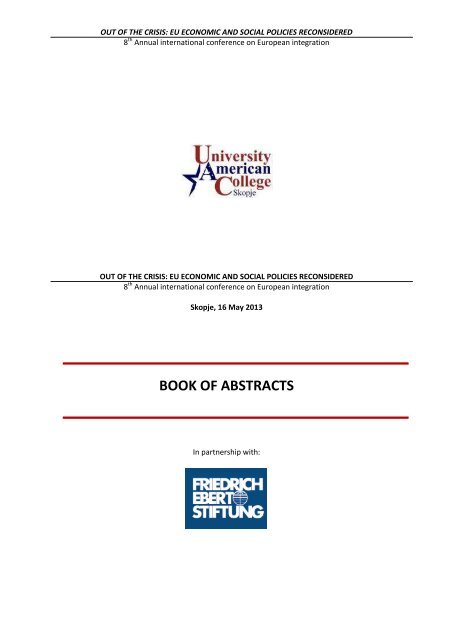


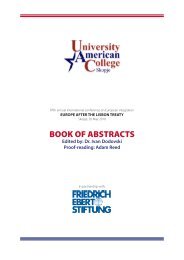

![amerikan kolex ]e bide prv univerzitet od treta generacija vo ...](https://img.yumpu.com/47278343/1/190x252/amerikan-kolex-e-bide-prv-univerzitet-od-treta-generacija-vo-.jpg?quality=85)

